Tw Mention Of Self Harm - Tumblr Posts
scars in fiction: I got this trying to save my lover from an assassin- but tragically, I was too late. now I carry the mark of my failure with me always, and I can never forget~
scars in real life: so I was trying to open macaroni sauce with a paring knife
the many faces of tom riddle, part 1
-no hate (this is merely my humble opinion) but i strongly dislike tom hughes as tom riddle, and here’s why-
FULL DISCLAIMER THAT THIS IS JUST MY OPINION OF A CHARACTER WHO DOESN’T HAVE THE STRONGEST CANON CHARACTERIZATION, AND THUS ALL THIS IS BASED ON MY CONCEPTUALIZATION.
Just personally, this fancast induces a lot of cognitive dissonance for me, but this is the first time I’ve been able to sit down and articulate properly why it always throws me for a loop.

Now, does he fit the visual/aesthetic archetype?
Yes. I understand completely why people like this fancast. We know that he is studious, intellectual, and (at the time people generally fancast him for) involved in the criminal underground, and he more-or-less fits the physical description.
And, to be clear, it’s not that I don’t think Tom Hughes could play Tom Riddle, it’s that I don’t think the character he plays in the fancasts is a close enough approximation of Tom Riddle.
For me, herein lies the issue.
Tom Riddle’s character is all about the emotions bubbling under the surface. He’s a disaster waiting to happen -- he’s angry, he’s lonely, he wants revenge, he feels empty and hopeless and desperate, he’s irrational...

Not sure what movie/show the Tom Hughes clips come from, but the character he plays isn’t that at all. the character he plays is very self-possessed, poised, self-aware. Reflective. Remorseful (there are clips of him crying when/after he shoots someone). Introspective.
That, to me, is not Tom Riddle at all.
Yes, he does deal with moral conflict, but it’s never at the forefront of his mind. It’s not something he’s constantly grappling with. He doesn’t really... brood in this Hamlet-esque way.
Tom doesn’t think. Sure, he plans, he ruminates, he rationalizes a posteriori. But he’s very unaware of himself (in fact, it’s one of his fatal flaws). It’s not that he doesn’t have emotions; just that his internal state is a mystery most of the time.
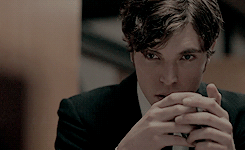
He doesn’t connect with his own emotions; he is completely estranged from them. Tom cannot tell you whether he is happy or sad (not just because of his pride). He keeps his emotions and moral compass (which are highly uncomfortable things), in a locked little box, swallows the key, and disregards them. And yet, this character connects so deeply with his emotions that even the audience can see exactly what he’s going through.
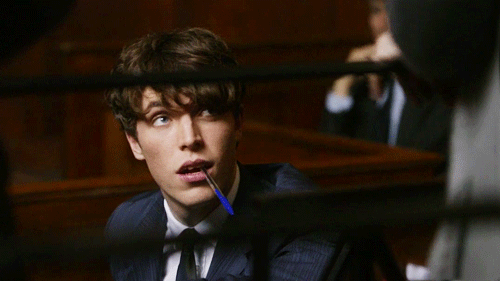
(There’s an openness -- an ease of vulnerability -- that Tom Riddle doesn’t have)
The thing about Tom, is that he hates himself just as much as he hates everyone around him. Creating Horcruxes to save himself from death is not an act of self-love, or even narcissism to the extreme; instead, forcibly ripping your own soul seven times is the most literally and metaphorically self-destructive thing a person could possibly do.
"Of the Horcrux, wickedest of magical inventions, we shall not speak nor give direction —"
If we go all the way back to Book 1, Harry Potter and the Philosopher’s Stone, you’ll remember that the eponymous material (first described in the Epic of Gilgamesh) is capable of producing the Elixir of Life, a magical substance that makes its drinker immortal, as long as you have a steady supply. Not only that, but according to the beliefs of historical alchemists (such as Nicholas Flamel), it was capable of curing any disease. In the alchemical tradition, it symbolized perfection, enlightenment, and heavenly bliss.
If all Tom Riddle was concerned about was prolonging his life, this is the obvious (and better) option.

Here’s the alchemical symbol of the Philosopher’s Stone. Looks kind of like the Deathly Hallows symbol, right? It represents the interplay of the (at the time, believed) four elements of matter -- a sort of periodic table, if you will.
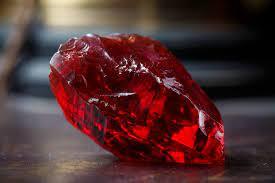
The mature Philosopher’s Stone was believed to be a red stone (for making gold), and the immature one a white stone (for making silver). Rubeus Hagrid and Albus Dumbledore, anyone??
"So he's made himself impossible to kill by murdering other people?" said Harry. "Why couldn't he make a Sorcerer's Stone, or steal one, if he was so interested in immortality?"
And Dumbledore responds:
"But there are several reasons why, I think, a Sorcerer's Stone would appeal less than Horcruxes to Lord Voldemort.”
"While the Elixir of Life does indeed extend life, it must be drunk regularly, for all eternity, if the drinker is to maintain the immortality. Therefore, Voldemort would be entirely dependent on the Elixir, and if it ran out, or was contaminated, or if the Stone was stolen, he would die just like any other man. Voldemort likes to operate alone, remember. I believe that he would have found the thought of being dependent, even on the Elixir, intolerable...”
And while, yes, he did try to steal it rather than make it, I am sure that in the time it took Tom to make all of his Horcruxes, he could have learned enough alchemy to produce it for himself (or wheedled the information out of Nicholas Flamel). While Dumbledore hypothesizes that it’s because Tom hates feeling dependent, this must be irony, because he spends the first book as a literal parasite, the next three as a virtually helpless creature, and the remainder still reliant on his Horcruxes.
"Well, you must understand that the soul is supposed to remain intact and whole. Splitting it is an act of violation, it is against nature."
But, like me, Dumbledore is making guesses at Tom Riddle’s internal state, and in this case, I think, he’s made an oversight. Horcruxes make him equally as dependent as the Philosopher’s Stone would have. It’s been established in canon that you cannot make yourself immortal without help; either you rely on the continued existence of your Horcruxes or your supply of the Elixir.

And while the Elixir represents the positive aspects of eternal life, like renewal, rebirth, and the cyclical nature of the universe (see above the ouroboros of Cleopatra the Alchemist, one of the four women who knew how to make the philosopher's stone), a Horcrux is antithetical to life. It represents disorder, and once the creator of Horcruxes dies, they are unable to move on from Limbo -- shut out of the cycle. Harry describes Tom’s mangled soul as looking like a flayed and mutilated baby -- permanently immature and stagnant.
This theme of destruction is furthered by the Golden Trio’s discussion on how to reverse the process:
Ron: "Isn't there any way of putting yourself back together?"
Hermione: "Yes, but it would be excruciatingly painful."
Harry: "Why? How do you do it?"
Hermione: "Remorse. You've got to really feel what you've done. There’s a footnote. Apparently the pain of it can destroy you. I can’t see Voldemort attempting it somehow, can you?"
With this in mind, we can surmise that Tom is either (a) impatient, which we know he is not (b) there was some deeper reason for favouring Horcruxes -- so, yes, I believe that either metaphorically or literally, this was self-harming behaviour.
He takes on the name of Lord Voldemort because he hates himself, Tom Marvolo Riddle. He hates the Muggle part of himself so much that he’s willing to tear apart his entire being.
"Voldemort, is my past, present, and future, Harry Potter..."
If that isn’t renouncement of himself, I don’t know what is. He was clearly not born Voldemort.
While of course, this does NOT excuse ANY of his actions, I find it vastly implausible that the likes of Malfoy, Mulciber, Carrow, etc... would have been welcoming in any way, shape or form to an assumed ‘Mudblood’ in scruffy secondhand robes from a London orphanage, and as such, indoctrinated him into his fanatic belief in blood-purity via antagonizing him.
(Imagine Hermione, but poor and without parents, in the 1930s/40s. She would not have been treated well in Slytherin, either.)
Children are more vicious than you think. And while Tom probably gave as good as he got at Wool’s Orphanage (and was possibly an active aggressor himself), Hogwarts wouldn’t have been a level playing-field. (I’ll talk a bit about this and the significance of the Gaunt Ring in Part 2).
In other terms, I think Tom was bullied for having dubious origins. That’s often the swiftest way to radicalize someone, and would have left Tom with a crippling sense of self-hatred that I don’t think he would have even picked up from the orphanage.
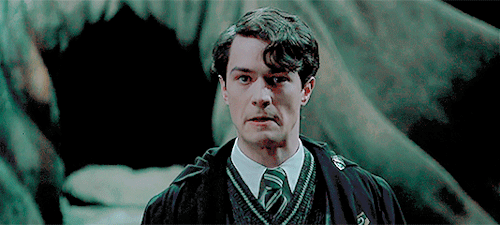
(And it’s possibly this early experience with relational aggression that results in his constant need to be on the offensive/defensive, distrust of others, and fear of vulnerability. To me, this is an archetypal response of someone who was a past victim of bullying.)
Why else would an extremely powerful half-blood subscribe so strongly to those beliefs? (Rather than discriminating via amount of raw power or something -- because what Tom is immensely proud of when Dumbledore meets him is his ability, not his parentage). But I digress.
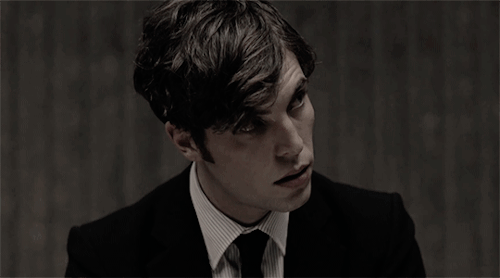
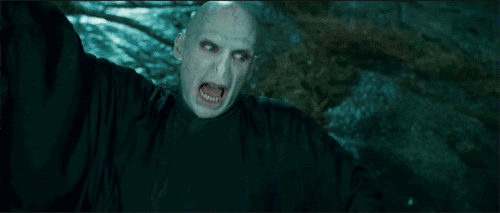
Now, Tom Riddle is never, ever quietly menacing like this. The mask is either completely on or completely off. We never see this character angry. Tom Riddle, when the mask slips off, is fury incarnate. Anger is the one emotion he doesn’t find weak; the one emotion he’s completely and utterly honest with.
Besides, that brings me to my next point. Tom’s not quite so austere. In fact, he’s quite witty, and often quite pleased with himself.
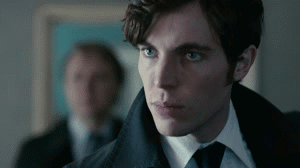

Just look at the difference in their body language. Tom has much more fluidity (he’s circling Harry, the head-tilt, the eyebrows move and he smiles a bit) than the other character, who has so much tension. Yes, they’re both menacing, but in completely different ways. Tom is comfortable with his actions, no matter how shitty they are. This other guy doesn’t like doing what he’s doing, but he’s going to do it, anyway.
Contrasted with the above, Tom’s unawareness of himself is such that we end up with a character who has a bizarre mix of extreme self-hatred and high self-esteem -- he always believes he is in the right -- in this case, doing Salazar Slytherin’s noble work -- while going to extreme, self-destructive lengths, such as tearing himself in half at the mere age of sixteen.
So, sorry... I kind of get the appeal, but... I don’t like the fancast.
(More unpopular opinions coming at 5:30 PM EDT tomorrow!)
the many faces of tom riddle, part 2
-you dislike frank dillane’s portrayal of tom riddle only because you don’t think he’s attractive-
FULL DISCLAIMER THAT THIS IS JUST MY OPINION OF A CHARACTER WHO DOESN’T HAVE THE STRONGEST CANON CHARACTERIZATION, AND THUS ALL THIS IS BASED ON MY CONCEPTUALIZATION (and this time, featuring a bit of armchair child psych from a student).

Wait, don’t clutch your pearls just yet. Compose yourself.
I am about to explain why it’s not actually that bad, and Dillane’s portrayal is vastly underappreciated.
I definitely agree that his portrayal comes off as ‘creepier’. It’s not helped by the stylistic decisions in the scene -- the smeary, green filter gives the scene a sinister quality.

Even Slughorn looks suspect here, which is somewhat appropriate, given that he is complicit in this crime.
Again, this scene is very much intended to be slightly off.
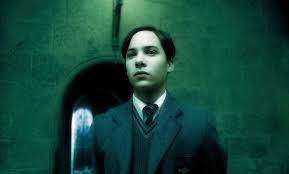
You’ll notice (and I’ll discuss this again when I talk about Coulson’s portrayal) that Dillane is almost always shot from at least slightly below, which makes the lower third of his face look bigger (and thus more menacing). The lighting also makes his eyes glow in a really unnatural way. There’s an echo-y effect to make his voice (and not Slughorn’s) sound unnerving.
People talk about how Coulson would have looked in this scene, and if he was filmed in the same way (monotone, smeary/shadowy filter, and always from below), he’d look a bit creepy, too.
But all of this, imo, is for a pretty good reason. Slughorn isn’t the POV character. Harry is. Harry is learning about how a young Lord Voldemort wheedled the secret of Horcruxes out of an unsuspecting teacher. Unlike in COS, he expects Riddle to be evil. And, so, Harry’s new perception of Tom Riddle literally colors how we perceive him.

Take this shot, for example: he does that head-tilt thing that Coulson does, and it’s actually... kind of... cute???
Imagine Dillane filmed from slightly above, like Coulson usually is, and it looks even more innocent. (I mean, come on, he does not look like he’s killed four people, does he?) It’s not hard to imagine teachers being taken in by this kind of act.

Even that little smirk he does when the camera (aka, Harry’s gaze) pans in, is for Harry’s benefit. No one else noticed that.
However, I still fail to find this creepy, like, at all. Yes, it’s a fake smile, but he’s portraying a different side of Tom Riddle to Coulson. Whereas, in COS, he’s in his vindictive, murderous element, where he’s free to express himself, in this scene, Tom Riddle is doing what he does best -- manipulating and managing appearances.
This entire scene is an act. And because Harry knows it’s an act, it should look a bit stilted.
From the Hepzibah Smith scene in the books: Voldemort smiled mechanically and Hepzibah simpered.
So, Harry is pretty adept at parsing Tom’s fake expressions.
But just look at the expressiveness in his face: he goes from brooding, he blinks, and his entire face changes to this charming (fake) smile.
At the risk of sounding elitist, I’m a bit tired of seeing the word ‘psychopath’, which is not an actual medical diagnosis recognised by any psychological or psychiatric institution, being tossed about, especially with reference to Tom Riddle (and from a neuroscience perspective, it’s doubly annoying). There’s no such thing as ‘insanity’ or ‘psychopathy’ or being ‘crazy.’
-although I use it too a shorthand in conversation to distinguish ‘canon’ Tom from his ‘softer’ OOC counterparts, I really shouldn’t-
Unfortunately, I’ve seen the ‘psychopath’ comment used time-and-time again as an excuse or a full explanation of ‘why Tom Riddle went evil’ (JKR in fact, has made a weird comment in an interview, basically saying that ‘psychopaths can’t be redeemed or learn adaptive coping skills’ or whatever), which really just goes to show the lack of understanding and compassion when personality disorders, especially, are concerned.
But what I like most about the opening of this scene, actually, is that first, listless expression. And this is where we get slightly into headcanon, but Tom Riddle is the opposite of a happy, mentally healthy teenager. By Dumbledore’s own admission, he has no real friends. He has no parental figures, no real attachments. Yes, he might derive some pride or enjoyment from being good at magic and top of his class and all that, but I really don’t think even Tom finds that truly fulfilling. There is nothing that makes him happy.
In fact, although some might perceive it as ‘creepy’, I think that listless expression is an accurate window into Tom’s psyche.
I know people aren’t big on Freud, but I think that he does make some interesting points (also, cut the guy some slack for being relatively open-minded for the Victorian Era, and inventing psychoanalysis and while yes he did say some sexist stuff, good luck finding a field of science that isn’t male-focused and makes crazy generalizations about women, especially back in the day) about the possible origins of thanatophobia, the fear of death.
According to Freud, thanatophobia is a disguise for a deeper source of concern -- he did not believe that people were capable of conceptualizing their own death to that extent. Instead, he believed that this phobia was caused by unresolved childhood conflicts that the sufferer cannot come to terms with or express emotion towards.
Now, I know Freud almost always attributes mental distress to childhood experiences, but I think in this case, it really has some merit.
According to attachment theory, the basis of how we form attachments in adulthood is dictated by learning it from experiences with caregivers in the first two years of life. We know Tom was born in an orphanage, and that he didn’t cry much as a baby, and subsequently, probably received very little attention. Compounded with possible genetic factors and his caregivers being afraid or wary of his magical abilities, he later struggled to form attachments because of this -- I would actually go so far as to say that by the time Dumbledore meets him, Tom Riddle is severely depressed.

And that flat affect and anhedonia, I think, comes over very well in Dillane’s portrayal. There’s kind of this resignation -- a very deep sadness and loneliness to his character.
Of course, he doesn’t derive any comfort or fulfillment from human interaction, because (to borrow the description from the Wikipedia article on ‘Reactive attachment disorder’, which Tom meets all the criteria for) he has a “grossly disturbed internal working model of relationships.” In other words, he is unresponsive to all offers of attachment because of this unacknowledged trauma.
(You could arguably class Tom as having an avoidant attachment style, but I think in his case the trauma and its effect on him are severe enough to call it disordered.)
RAD isn’t particularly well-characterized (especially neurologically) and quite new in the literature, but here are some links if anyone is interested in doing a bit of digging: Link 1 | Link 2 | Paper 1 | Paper 2
And, instead of trying to resolve this conflict in a healthy way, or at least recognize that this is why he can’t be happy and try to learn how to cope from there, he (a) represses the desire for human attachment and (b) funnels that negative emotion into being the fault of Death, the Grim Reaper (again, to borrow Freudian terms).
And we all know how that turned out...
(And now, this should go without saying, but psychoanalyzing fictional characters has nothing to do with assigning a morality to mental disorders. Mental illness is neither a cause nor an excuse for criminal behavior -- in the same way that the cycle of violence is a phenomenon, not an excuse. Tom Riddle did not become a genocidal murderer because, in common parlance, he was a ‘psychopath’ -- he was not necessarily ‘predisposed’ to evil and could just as easily chosen to not follow the path that he did -- instead, he willingly made poor choices. This is a descriptive analysis, not a justification -- a ‘how’, not a ‘why’)
Here’s a Carl Jung quote that articulates it better:
“I am not what happened to me, I am what I choose to become.”

Yes, he’s a bit stiff (and a lot more formal than in COS during his *conversation* with Harry). But, and here comes the controversial bit, this is appropriate for a portrayal of a schoolboy in the 1940s. The upright posture is accurate -- respectful, polite -- everything Tom Riddle would have been expected to be (and even Coulson, in that scene with Dumbledore in COS, is quite stiff). Even the way he looks at Slughorn and maintains eye contact is very *respectful.*
And, Dillane (I think he’s seventeen or eighteen here) actually looks like a believable sixteen-year-old. I’m sorry, I love Coulson’s portrayal as well, but he looks around nineteen in COS; so in HBP, he probably would have looked at least twenty-two or so. (Sorry, not sorry).
This may be influenced by my own interpretation of the character (because I imagine Tom always looks young for his age, and Dillane fits that archetype, but I don’t think that’s very popular), but I think young Tom Riddle is supposed to be *cute* and a bit stiff/shy/awkward (being charming and awkward is very much possible), if you consider the way Dippet and Slughorn treat him.
To support this, he says very few words to Hepzibah Smith (in the book, that scene’s not in the movie), and is very... bashful and coy during the whole interaction? I think yes, he’s charismatic, but he’s not loud, suave, openly flirtatious or particularly verbose. Tom Riddle should have a quiet magnetism, and to me, that came across in Dillane’s portrayal.
"I'd be glad to see anything Miss Hepzibah shows me," said Voldemort quietly, and Hepzibah gave another girlish giggle.
...
"Are you all right, dear?"
"Oh yes," said Voldemort quietly. "Yes, I'm very well. ..."

Even the ‘ugly, greedy look’ described in the books, when Slughorn starts spilling his secrets, is there. This is how he’s supposed to look! Slughorn glimpses it, but doesn’t understand its significance. Harry does.
“Slughorn looked deeply troubled now: He was gazing at Riddle as though he had never seen him plainly before, and Harry could tell that he was regretting entering into the conversation at all.”
Remember the context of this moment, as well: He’s just discovered how to create multiple Horcruxes. Excuse him for looking a bit creepy (if not now, then when?).
Here’s two direct quotes of Harry’s impression of Tom Riddle in that scene:
“But Riddle's hunger was now apparent; his expression was greedy, he could no longer hide his longing.”
“Harry had glimpsed his face, which was full of that same wild happiness it had worn when he had first found out that he was a wizard, the sort of happiness that did not enhance his handsome features, but made them, somehow, less human. . . .”

Tom Riddle’s Horcruxes are a direct metaphor for his refusal to allow himself to heal from his trauma -- instead, he continues to inflict destruction on himself and others.
His desire to continue creating more Horcruxes sort of resounds with the fact that self-harm can also become a compulsion.
I’d also like to digress a bit to discuss the Gaunt Ring, while we’re at it. While we’ve talked about his attachment issues in general, this discussion is particularly pertinent to father figures. And while Tom’s attachment issues are extensive, I think there’s ample evidence that as a child, he craved acknowledgement and acceptance from a father figure -- the man who gave him the only thing Tom truly owned -- his name. He would have had a vaguely defined mother figure in Mrs. Cole, perhaps.
"You see that house upon the hillside, Potter? My father lived there. My mother, a witch who lived here in this village, fell in love with him. But he abandoned her when she told him what she was.... He didn’t like magic, my father ... He left her and returned to his Muggle parents before I was even born, Potter, and she died giving birth to me, leaving me to be raised in a Muggle orphanage ... but I vowed to find him ... I revenged myself upon him, that fool who gave me his name ... Tom Riddle. ..."
We know that by June of 1943 (COS flashback) Tom has already uncovered the truth of his parentage; he knows he is the Heir of Slytherin via the Gaunt line, and he describes himself to Dippet as ‘Half-blood, sir. Witch mother, Muggle father.’
In Part 1, I discussed the high probability that as a presumed ‘Mudblood’, Tom Riddle was treated rather poorly in Slytherin House. But by this scene in the fall of 1943, he is surrounded by a group of adoring hangers-on. Why?
In my opinion; the Gaunt Ring. We know that Tom stopped wearing it after school, so its sentimental value couldn’t have been that great. We know he likes to collect objects (which I believe stems from his attachment issues -- he seeks comfort in things instead of other people).
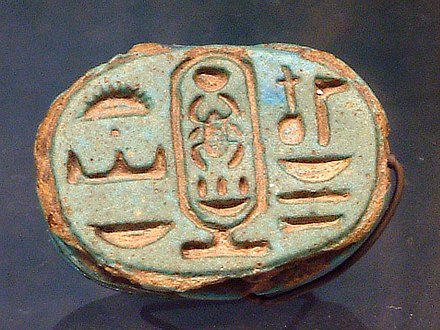
Signet rings (such as the one belonging to Tutankhamun seen above) were used to stamp legal documents and such, in order to certify someone’s identify -- like an e-certificate, if you will. Like Tutankhamun’s ring, the Gaunt Ring bears an identifying symbol -- Marvolo Gaunt tells us proudly that it bears the Peverell family crest.
By the Middle Ages, anyone of influence, including the nobility, wore a signet ring. Rings in antiquity were auspicious -- they signified power, legitimacy, and authority. And so, I believe that all the Sacred Twenty-Eight families would have worn these, too.
And so, bearing the Gaunt Ring would have established Tom Riddle, symbolically and in the eyes of the Sacred Twenty-Eight (his future supporters and followers), as the legitimate heir to the House of Gaunt. This is why, I believe, Tom coveted the ring as soon as he saw it -- not just because it was a family heirloom, and not just because he thought it was a pretty toy for his collection.

(He curses it so that no one else but him can wear the Gaunt Ring safely.)
This is why, to make the legitimization literal as well as symbolic, Tom murders his father and grandparents. It’s not just an act of vindictive, murderous rage due to his perception of being rejected by his father (although it is that, too). And so, Tom, abandoning his search for a father figure (and possibly also giving up on the possibility to allow himself to heal from his own personal trauma rather than continue to inflict it on others), ‘cleanses’ his bloodline, to make himself truly legitimate. It’s rather telling that instead of affirming his legitimacy as a Riddle, which would have put him in line for a nice inheritance, and hey -- money is money -- (thus accepting his half-blood status), he simply kills them all. He has done all the murdering he needs to become immortal (and he hasn’t had the discussion about multiple Horcruxes yet); but yet, he does it again. Frightening stuff.

(Just look how the others look at Tom. All but the one to his left -- possibly Nott, Rosier, or Mulciber -- have their torsos turned towards him. Their attention is on him, while he knowingly regards the viewer/Harry. Tom seems a little uncomfortable with the attention.).
“And there were the half-dozen teenage boys sitting around Slughorn with Tom Riddle in the midst of them, Marvolo's gold-and-black ring gleaming on his finger.”
...
“Riddle smiled; the other boys laughed and cast him admiring looks.”
...
“Tom Riddle merely smiled as the others laughed again. Harry noticed that he was by no means the eldest of the group of boys, but that they all seemed to look to him as their leader.”
The ‘gang’ are true hangers-on; Tom doesn’t seem to pay them much attention.
So, if not via careful flattery or charisma, the attraction must be status.
And perhaps yet more telling...
"I don't know that politics would suit me, sir," he said when the laughter had died away. "I don't have the right kind of background, for one thing." “A couple of the boys around him smirked at each other. Harry was sure they were enjoying a private joke, undoubtedly about what they knew, or suspected, regarding their gang leader's famous ancestor.”
That, in my opinion, is as good as we’re going to get as proof that Tom’s shiny new signet ring (and by extension, his new status) made a big impression on his fellow students.
So, when he returns to Hogwarts, he is ‘pureblood’. He is cleansed of his Muggle roots, and becomes the legitimate heir of the House of Gaunt, now well on his way to becoming Lord Voldemort...

Watch the scene again, with a critical eye, and imagine Slughorn’s perspective, instead of Harry’s. There’s nothing creepy about Tom Riddle... unless you know what he is...
Strip away all the effects of Harry’s gaze (and notice, here he’s still looking at Harry), and he’s quite the charmer, actually.
(I will concede that I don’t like the promotional images where they have him looking like he’s up to no good. And I do wish he blinked once in a while.)
My challenge to you: Rewatch the scene with an open mind, and let me know if you agree that Dillane’s portrayal comes off as depressive rather than ‘creepy.’ And if not, why do you dislike his portrayal?